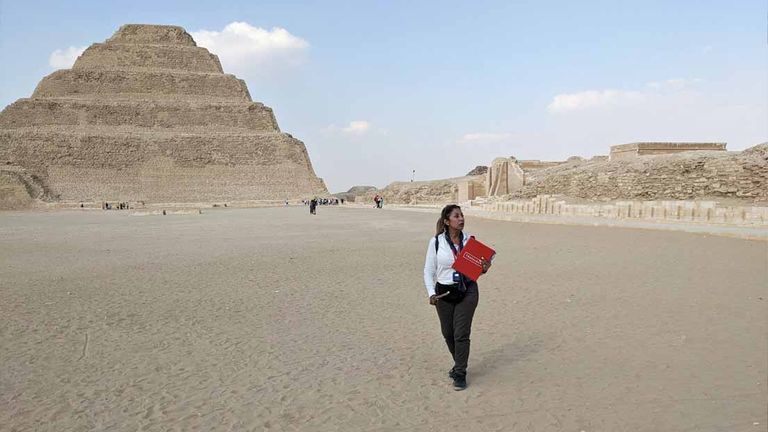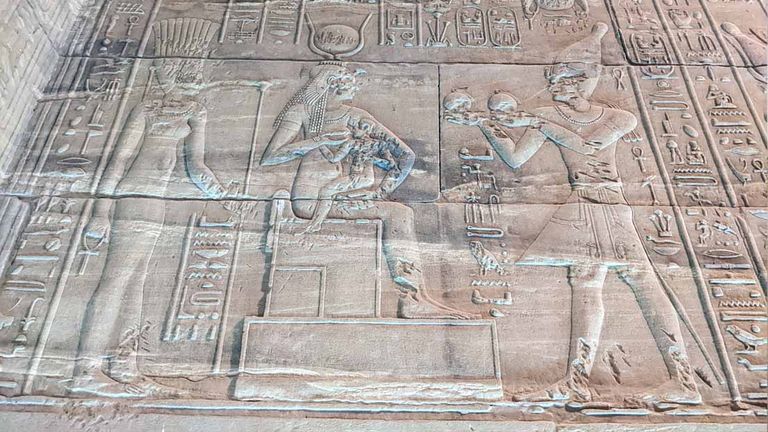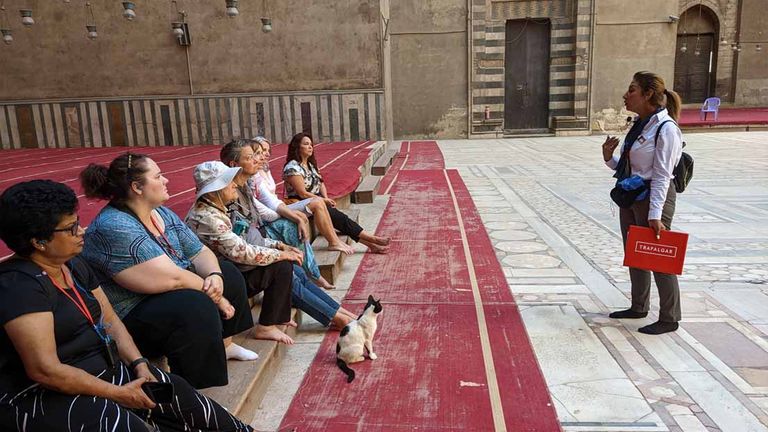“Goddesses, yalla yalla,” Amira Hosny called out. “Let’s go, let’s go!”
It was time for her tour group of 12 women to explore the stately temple of Hatshepsut, the only female pharaoh to be buried in the Valley of the Kings. It was just one of the many sites we visited during Trafalgar’s Best of Egypt tour that is dedicated to ancient Egypt’s powerful women — whether mythical goddesses or one of Egypt’s greatest pharaohs.
Egypt is a destination in which many women feel wary about traveling solo. Though I’ve been to dozens of countries by myself, tackling the logistics of Egypt without a tour group seemed overwhelming. As a woman, I’ve felt extremely welcomed — and safe — in Muslim countries such as Morocco, Tunisia and Turkey, and I anticipated the same in Egypt. Still, I was thrilled to discover that Trafalgar had a nine-day Egypt tour just for women. I joined its inaugural group in October 2022.
 Tour director Amira Hosny at Saqqara
Tour director Amira Hosny at Saqqara
Credit: 2023 Johanna Read
The nine-day tour visits Egypt’s top sites, plus a few left off many other itineraries. Of course, ancient Thebes’ magnificent Karnak and Luxor temples and the Valley of the Kings are included, as is a Nile cruise to Aswan with its dams, along with must-see mosques, museums and pyramids in Cairo and Giza.
But, unusually, Trafalgar also visits the more than 3,000-year-old, nearly 40-foot-tall colossus of Ramesses II in Memphis and the 4,700-year-old Step Pyramid in Saqqara, which has limestone temple walls that are so intricately constructed they look as if they were laser cut yesterday. Trafalgar also blocks time for the added-cost excursion to the massive temples of Ramesses II and Nefertari at Abu Simbel.
 The goddess Isis breastfeeding her son, the god Horus
The goddess Isis breastfeeding her son, the god Horus
Credit: 2023 Johanna ReadEverywhere we went, Amira made a point of highlighting stories of women — ancient, modern and mythical. A knowledgeable guide is essential for countries such as Egypt — with its rich political and religious history, art and architecture — therefore, Trafalgar’s guides are called travel directors. And Amira is one of its best.
Throughout our nine days, she provided insights into both historical and modern-day Egypt. She explained, for example, that ancient Egyptian statues are predominantly of lionesses rather than lions “because lionesses are smart, hard-working and take care of others.”
Goddesses, yalla yalla.
“Unlike lions,” she added, poker-faced.
She also spoke about Egypt’s evolving patriarchy, how Egyptian marriage contracts work and the country’s rising divorce rate.
Why Book a Women-Only Tour
Most of Egypt’s tour guides (and, honestly, most Egyptians a tourist will encounter) are men. Amira’s calls of “Goddesses!” to round up our group were conspicuous. She told us that several of her colleagues were puzzled as to why she leads groups of only women, with some even asking if we didn’t like men.
To be fair, our group of goddesses was also curious why we had each chosen a female-only group. Most of us were traveling solo, though a few friends were traveling together. After discussing it, we found that the general consensus was that women-only groups are appealing because of the greater likelihood that everyone else won’t already be coupled up. We wanted to chat with a different person over fresh mango juice at the Temple of Isis than we did at breakfast, and sit next to someone on the coach who wasn't the person we took a dip with in our Nile boat’s rooftop pool.
 The women on the author’s Trafalgar tour hoped that their fellow tourgoers would look out for one another.
The women on the author’s Trafalgar tour hoped that their fellow tourgoers would look out for one another.
Credit: 2023 Johanna ReadSeveral women also expressed hopes that an all-female group would be more likely to look out for one another — regardless of where we fell in our group’s age range from late thirties to early eighties.
"When I asked for help, every one of you offered me a hand. Even when I didn’t ask, you were ready to help,” said one tourgoer, Maggie, while thanking the group as we ate cake for her 84th birthday.
Personally, I was particularly grateful that group members pointed out photo ops I would have otherwise missed and ensured I never forgot to carry water. Overall, we agreed our group felt more relaxed and caring than mixed-gender groups we’ve traveled with. The absence of mansplaining was just a bonus.
We also found that our tour group members had the desire to promote women in male-dominated societies. We tried to spend our money to support women where we could, choosing souvenirs crafted by women and looking for the rare shops not operated by men. Sometimes it meant disrupting norms. For example, at a papyrus store, a female salesperson answered questions for me, but when she stepped away to get a sample, a male colleague quickly muscled in. He ignored my comment that someone else was already helping me and was visibly angry when I went right back to my conversation with his colleague when she returned.
We were also encouraged to provide suggestions to help elevate women in Egypt’s tourism industry. In all its tours, Trafalgar includes “Be My Guest” experiences, generally with local families. In Luxor, it’s a visit to the El Boerey family’s compound to sample their mint tea and freshly baked sun bread and learn how they irrigate their crops from the Nile. Two men in the family explained details to us in fluent English, but we suggested that the women making the refreshments and running the household deserved greater profile and recognition of their skills — should they want it — with the men translating if needed.
Though only on Amira’s Egypt tours are they likely to be called goddesses, female travelers can book any of Trafalgar’s women-only tours. The growing portfolio includes destinations such as France, Greece, Iberian cities, Ireland, Italy, Jordan, Scandinavia, Scotland and Devon and Cornwall in the U.K.